- Home
- Brian Garfield
Marshal Jeremy Six #4 the Proud Riders Page 9
Marshal Jeremy Six #4 the Proud Riders Read online
Page 9
He drew back his arm and threw the shingle at Six’s desk. It hit the front of the desk and clattered to the floor.
“What do you know,” Dominguez said. “It does help.”
Chapter Nine
Harry Rose, Esq., sprinkled a dash of cologne in his hand, rubbed it together in his palms, and scrubbed it into his fat cheeks. His butler (who was in fact his part-time valet, and worked the rest of the time as groom to the race horse) held up Mr. Rose’s coat, and Mr. Rose poked his thick arms into it, shrugged it on straight, and adjusted his tie.
“Mr. Clete.”
“Sir.” The tall bodyguard appeared in the door. He was wearing his bowler hard-hat.
Harry Rose grimaced. At least, to those who knew him it was a grimace. Harry Rose was not inclined toward excessive exertion. A grimace, on that broad fleshy face, consisted of a half-inch stirring of the jowls, accompanied by an almost imperceptible deepening of the creases across the crimson forehead.
He said, “Mr. Clete, when will you learn to remove your hat when you’re indoors?”
“Sorry, Mr. Rose.” Clete removed the bowler hat and held it awkwardly in both hands.
“You can put it down somewhere. It won’t go away.”
“Yes, sir,” Clete said, beginning to get angry.
“Is Mr. Macquarie about?”
“I guess he’s in his room, sir.”
“Get him.” Rose turned away, indicating that the interview was ended.
Mr. Clete had just put down his hat on a chair. Now he scooped it up with an angry gesture and tramped out of the hotel suite. Rose heard the door slam. It caused the slightest of smiles to touch his florid face.
“You may attend to the Red Beauty,” he said to the butler, whereupon the butler nodded and left.
The Red Beauty, Harry Rose thought. A pretty piece of horseflesh. A really handsome animal. To be sure, it wasn’t really a top-quality thoroughbred. It didn’t have the real smoothness of gait, the subtlety of changing pace that a really fine Kentucky animal ought to have.
Besides, it had a tendency to get nervous at the start, and to jump the starting gun. No truly well-mannered horse would be so badly trained as that.
But the Red Beauty made up for it. For one thing, the horse had an enormous chest—great staying power. Long after most of those pretty thoroughbred nags flopped by the wayside, exhausted, the Red Beauty would still be galloping grimly on. And for another thing, the beast had long and powerful legs. It didn’t run very smoothly, but it ran fast.
Ungraceful, lumbering, ill-mannered, nonetheless, a good horse.
“A good horse,” Harry Rose said out loud. He lifted his glance through the hotel window and studied the street below. Spanish Flat was a hick town, no question of that, in spite of that wise-cracking marshal of theirs. They’d fall all over each other to bet money against that highfalutin Eastern nag. Provincial and proud of their local products, the cowboys and cattlemen would bend over backwards to put their money where their faith was. And their faith, in this case, would be in the superiority of Western horses to Eastern horses.
Well, Harry Rose observed, it actually didn’t make much difference which horse won the race. If the Red Beauty won, it would be just gravy, on top of the other thing. But, just the same, he’d like to show up these country bumpkins.
Harry Rose was a grossly fat man. All his movements were conservative, sluggish. And yet he had the keen, honed senses of a stalking predatory carnivorous animal.
He was facing the window. He had not turned. No perceptible sound had disturbed the air. And yet, without turning his head, Harry Rose spoke mildly:
“Come in, Mr. Macquarie. What kept you?”
Jay Macquarie, the little jockey, appeared in the door and said, in his whining Brooklyn voice, “How in hell you do it, I sure don’t know.”
“Do what?”
“Know when somebody’s comin’ up on you. I didn’t make sound.”
Harry Rose chuckled. Only then did he turn his back on the window and face the jockey.
He said, “You have word for me?”
“I didn’t figure it was important enough to wake you up.”
“I’m up now.”
“Yeah,” said Macquarie. He looked uncomfortable; his glance kept shifting. “I talked to the Lockharts, the old man and the one called Malachi. There’s been a hitch.”
“Go on.”
“You know that other son he had workin’ for the Wells Fargo people? Well, he’s turned up dead, and old man Lockhart’s mad. He’s ready to throw everything over and go gunnin’ for the guy he figures killed his son. He says it’s the same guy killed another son of his, year or more ago.”
Harry Rose murmured, “We haven’t got time for petty personal grievances. I hope you explained that to him.”
“He’s lost his son, Mr. Rose.”
“If that son was anything like the others, it wasn’t much of a loss.”
Macquarie looked away, as if he wanted to argue the point but lacked the nerve. What he said was, “Anyhow I tried to calm him down. Told him he could go after this killer any time, but the important business was right now. Told him to keep a lid on.”
“Wise,” Harry Rose commented.
“Asked him if he wanted to eat beans the rest of his life. I guess I finally persuaded him, but for a while I was afraid I’d have to get you to talk to him.”
“I’m glad you didn’t decide to do that, Mr. Macquarie. It wouldn’t be advisable for me to be seen talking to Lockhart.”
“Yes, sir. That’s why I didn’t do it.”
“Does Lockhart know exactly what he’s to do?”
“Yes, sir. He ain’t bright, but you pounded it into his head so many times down in Mexico that he can’t hardly go wrong.”
“You’d be surprised,” Harry Rose murmured in answer. “But he knows that Mr. Clete will be with him every step of the way.”
“Yeah, he knows. But he says just the same, he ain’t going to do it unless his other son gets out of jail in time. He ain’t going to lay the boy open to retaliation.”
“We’ll cross that bridge if we come to it,” Harry Rose said. He turned away, looking out the window again. When Macquarie didn’t leave the room immediately, Harry Rose said, “Something else on your mind?”
“Yeah. I figured maybe I ought to tell you. The Red Beauty ain’t too used to this kind of rocky turf out here. He’s getting pretty tender in the feet. I may have to put heavier shoes on him to protect them hoofs, and that could slow him down. I been watchin’ this Ben Chandler guy workin’ out his horse. And I can tell you something, Mr. Rose. The Red Beauty’s going to have to be in absolutely top condition if we want a prayer of winnin’ that race. And I hear there’s another fast stallion some rancher’s planning to enter. If it looks anything like Chandler’s black, we ain’t going to have no piece of cake this time.”
Harry Rose didn’t answer right away. When he did, his voice was thoughtful. “We’ll win the race, Mr. Macquarie. I want very much to win it; I intend to win it. If necessary, I’ll see to it that—”
“No, sir,” the little jockey said.
Taken aback, Harry Rose let his voice trail off. Finally he said, “What?” in a tone of disbelief.
“No, sir,” Macquarie repeated. He spread his hands. “Look, I know I ain’t no lily and I ain’t no angel. I’ve turned plenty a fast trick in my time, just like you. But I’m a funny kind of guy, Mr. Rose. Where I come from, horse racing is kind of a religion with the guys. I ain’t never fixed a horse race in my life. I ain’t hamstrung no horses to win, and I never put nothing in nobody’s oats or water bucket. I don’t care what kind of stunts we pull with that Lockhart trash, but when it comes to riding the Red Beauty in this town or anywhere else, I run an honest race. You hear me, Mr. Rose? Nobody ever accused Jay C. Macquarie of runnin’ a crooked race, and they ain’t going to start in now.”
Harry Rose took it without flinching. When Macquarie’s speech ended, Rose said
, “I can only say to you, Mr. Macquarie, what you said to Lockhart. Do you want to eat beans the rest of your life?”
“You know damn well, sir, that we ain’t going to win peanuts on this race. Three, four, maybe five thousand in side bets is the best you can expect. It ain’t worth taking no chances on fixing the race. Suppose we get caught and thrown in jail for fixing a two-bit race—what happens to Lockhart and that whole end of it then?”
Rose said, “You may be quite right, Mr. Macquarie, but I’d suggest you think twice before you ever use that tone of voice on me again. Now get out of here.”
Macquarie seemed about to add something, but when he looked at Harry Rose’s eyes he thought better of it, and swung with a quick snap of his shoulders and hurried out.
Harry Rose was shaken. It had been a long time since anyone had spoken to him like that. He thought he had insulated himself against that sort of thing long ago by surrounding himself with bodyguards and yes-men. But here, twice in a matter of a few days, he had found his insulation stripped away. First, it had been when the crusty marshal had knocked down Mr. Clete and directed his thinly veiled insults at Harry Rose. Unprotected, there was nothing Rose could do but take it with a silent smile. Then, today, Macquarie had challenged his authority.
Something was slipping. Harry Rose had the sickening feeling that it was all slipping down around his ankles. He didn’t like this town, didn’t like the feel of the place. Bad things were happening to him here.
But it was too late to change his plans. Once you set things in motion, you had to let them carry through to their ultimate conclusion.
He looked out of the hotel window, down into the street. Two blocks away, he saw a lean, small, one-armed man walk out of the sheriff’s office, get on his horse and ride north out of town.
Chapter Ten
Paradise picked up Chavis’ wife at Chainlink ranch and rode with her to Arroyo Seco. They arrived late at night: Connie had spoken very little during the long ride, and now, although she must be tired, she did not show it. When they entered the main street Paradise said, “Maybe you’d like to freshen up first at the hotel.”
“Don’t be silly. Where’s the doctor’s house?”
Paradise poked his jaw in the general direction. “Down there. Connie—”
She looked at him. “Yes, John?”
He said, “Tracy didn’t specifically tell me not to talk to you. I guess he didn’t expect me to ride that far. But he didn’t want you to know.”
“Just like a man,” she said. She halted her horse in front of the doctor’s house and suddenly reached out to grip Paradise’s wrist. Her eyes were earnest. “John, you’ve got to tell me the truth. How is he, really?”
“He’s got the constitution of a truck horse,” Paradise said gruffly. “He’ll be good as new, as long as he stays put long enough to give himself a chance to heal.”
“And how long is that?”
“You’d have to ask the doc,” Paradise said.
She stared at him gravely. “You’re not as arrogant as you used to be, are you? There was a time not so long ago when you wouldn’t have been able to worry about anyone the way you’re worrying about Tracy.”
“I’m not worried,” he said. “He’ll be fine, Connie.”
“You’re a bad liar.”
He made a face: finally he said, “You’re a hard girl to lie to.”
They dismounted. Paradise hitched the horses to the rail. He took her arm as they climbed onto the porch; he said, “Connie, the real reason I told you about him wasn’t the reason I gave you. He’ll be hopping mad I told you. If it had been only this broken blood vessel in his head, I wouldn’t have told you about it. I’d have waited until he was well enough to ride home and tell you himself.”
“Then what is it?”
They stood at the door, but neither of them touched it. Paradise said, “It’s that damned stubborn streak of Tracy’s. That’s what got him into this mess—he kept punishing himself long after he should have quit. And it will kill him if we don’t stop him.”
“Kill him, John? What do you mean by that?”
He said bleakly, “He’s got his mind set on riding the palomino in that goddam race next week.”
She said, “I should have known. It’s exactly what he’d do.”
“I haven’t been able to talk him out of it,” Paradise said. “It’s up to you, Connie.”
The look she gave him was compounded of gratitude and concern. Paradise turned, lifted his fist, and knocked on the door.
Chavis said hotly, “You had no right to tell her. Who put you in charge?”
Paradise lifted the empty plate from Chavis’ lap. He said, unruffled, “Had enough to eat, partner?”
Connie sat on the edge of the bed and reached for her husband’s hand. Chavis gave her a dreary look. His eyes, Paradise thought, were beginning to clear up. It was a good thing, too; if Connie had seen him the way he’d been a few days ago, she’d have fainted from fear.
Or maybe she wouldn’t have. Connie was a pretty strong girl. But no girl was too terribly strong when it came to danger facing someone she loved.
She said to Chavis, “You’re getting upset over nothing Tracy. After all, it’s only natural that John would have told me. You didn’t tell him not to.”
“I expected him to have brains enough to know I didn’t want you to have to worry about me.”
“The only thing I’m worried about,” she said, with a sidewise glance at Paradise, “is that stupid stubborn look on your face. You’ve got to give up this idea of riding in that horserace. Right now.”
Chavis said, “I made a promise when I went out to catch that horse. Nothing’s happened to change anything.”
“Except,” Paradise said, “that now you’re gambling with your life and not just a couple thousand dollars.”
“Everybody who comes West comes to gamble,” Chavis answered.
Paradise leaned forward and said bluntly, “You can’t collect any money from the grave, Tracy. Not a stinking penny.”
“I’ll be all right by next week. I’ll be fine.”
“Then you haven’t been listening fast enough. I heard the doc talking to you, partner. If you so much as set foot in a stirrup for the next two or three months, you’re taking a chance on rupturing that thing and starting the internal bleeding all over again. Only next time you could end up dead from it.”
“He’s just guessing,” Chavis said. “He admitted there was no proof it would open up again.”
Connie said, “You’ve got no right to take that chance, Tracy.”
His eyes flashed. “It’s my life!”
“No,” she answered. Her voice was level and even. “It’s mine, Tracy, and it’s Peggy’s. You’re taking a chance with the life of Peggy’s father and my husband. Not your own life. Ours. You belong to us, Tracy, as much as you belong to yourself.”
John Paradise got up and moved to the window. It was pitch black outside; lamplight reflected against the pane, and obviously he could see nothing through the window except the reflection of the room in which he stood. But he stood there with his back to the room, staring into the window, and said, “It’s about time you quit playing games, Tracy. The stakes are too high.”
Chavis said bleakly, “I told you to keep your mouth off me, John.”
“Maybe you didn’t tell me loud enough,” Paradise murmured. Turning around to face the bedridden man, he said in a compassionate voice, “Tracy, right now you hate me for reminding you that you can get scared. You like to think of yourself as a man to be reckoned with, and you hate to admit to any kind of weakness. Well, weakness is human, partner.
“When you get that taste in your mouth like dry brass, that’s the taste of fear, and there’s not a damn thing to do about it but stand up and face it. You’re not facing it, Tracy, you’re sticking your head in the sand and pretending it’s not there. It just isn’t any good any longer.”
Chavis blinked. Connie said softly, �
��Listen to him, Tracy. He’s telling you gospel truth.”
Paradise said, “And I’ll give you something else to think about it, while we’re on the subject of horse racing. There’s a new contender in the race. An Eastern thoroughbred that stands at least sixteen hands high. Ridden by a jockey. That jockey weighs maybe a hundred and five, hundred and ten pounds. What do you weigh, Tracy? Hundred and ninety? Two hundred?”
Chavis’ eyes had become slowly bitter. Paradise kept right on, grinding it in: “If you ride that race, partner, you’re giving your own horse a ninety pound handicap to fight. I don’t think any horse can do that and win.”
“What do you expect me to do? Cut off both legs to reduce my weight?”
Connie’s hand flew to her mouth; she glanced fearfully at Paradise, and back at her husband.
Suddenly aware of what he had said to Paradise, Chavis flushed scarlet. “Christ, John, I didn’t mean that the way it sounded.”
“I know you didn’t. But think about it anyway. Got any idea what a human arm weighs, Tracy?” Paradise came toward the bed patting his flat belly. “I’m a little bigger than that fancy jockey of theirs, but not much. And he’s got the weight of two arms. I’ll bet you I don’t outweigh Macquarie by more than fifteen pounds at the most.”
And he added, “Besides, I’ve been riding the palomino around for you. You asked me to do it. He’s used to me on his back now.”
Chavis shook his head. “I can’t ask you to do that for us, John. It’s not your race to run.”
“It is if I want to make it mine. You’re hardly in a position to stop me.”
Connie reached out toward Paradise. “John—”
Chavis dropped his chin toward his chest. With the subdued voice of a defeated combatant, he said, “I guess I haven’t got much choice, have I?”
No one spoke for a moment. Connie turned to her husband; gently they clasped hands. Paradise, watching this, felt his own face harden. He turned away, to avoid looking at the two of them any longer. He felt angry with himself.

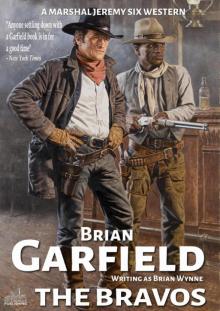 Marshal Jeremy Six #3
Marshal Jeremy Six #3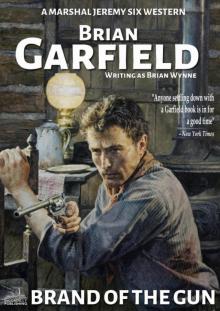 Marshal Jeremy Six #6
Marshal Jeremy Six #6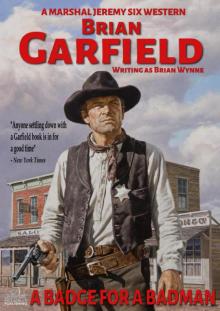 Marshal Jeremy Six #5
Marshal Jeremy Six #5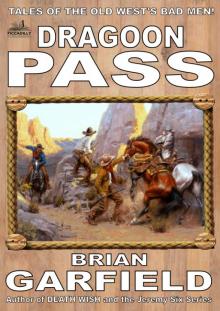 The Outlaws 2
The Outlaws 2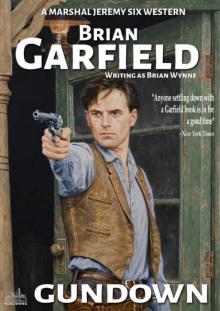 Marshal Jeremy Six #7
Marshal Jeremy Six #7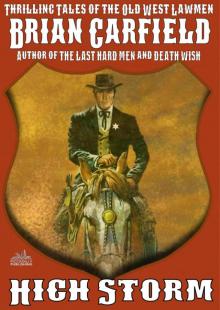 The Lawbringers 4
The Lawbringers 4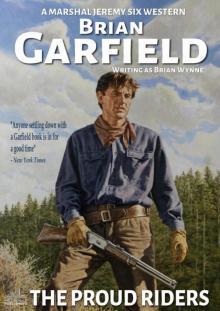 Marshal Jeremy Six #4 the Proud Riders
Marshal Jeremy Six #4 the Proud Riders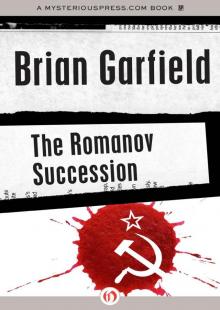 The Romanov succession
The Romanov succession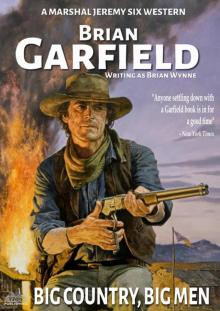 Marshal Jeremy Six #8
Marshal Jeremy Six #8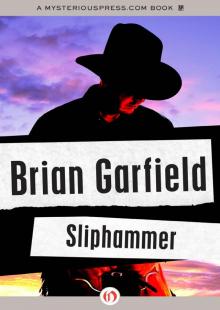 Sliphammer
Sliphammer Line of Succession
Line of Succession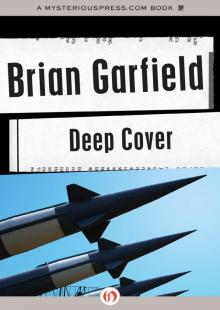 Deep Cover
Deep Cover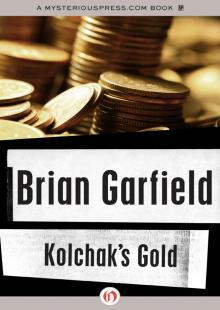 Kolchak's Gold
Kolchak's Gold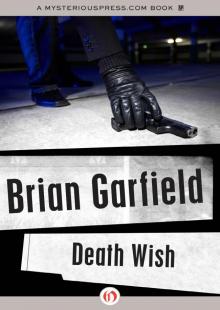 Death Wish
Death Wish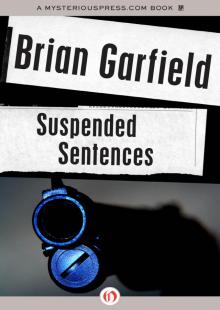 Suspended Sentences
Suspended Sentences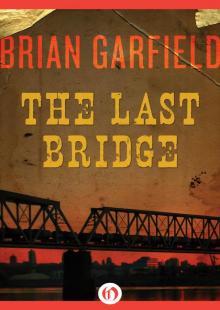 The Last Bridge
The Last Bridge Relentless
Relentless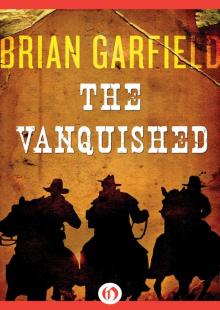 The Vanquished
The Vanquished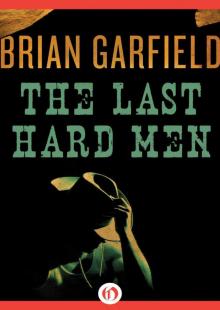 The Last Hard Men
The Last Hard Men Hit and The Marksman
Hit and The Marksman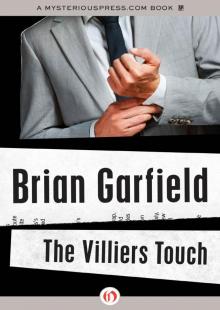 Villiers Touch
Villiers Touch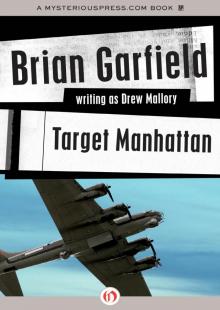 Target Manhattan
Target Manhattan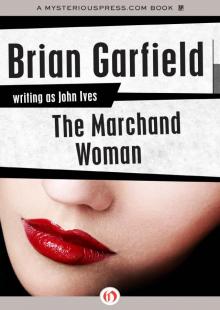 Marchand Woman
Marchand Woman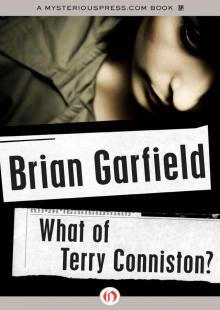 What of Terry Conniston?
What of Terry Conniston?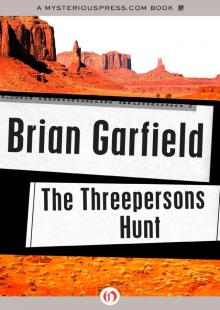 Threepersons Hunt
Threepersons Hunt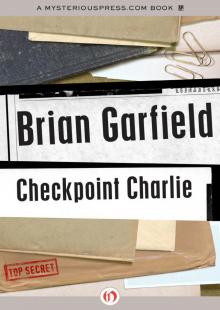 Checkpoint Charlie
Checkpoint Charlie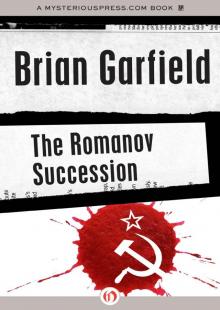 Romanov Succession
Romanov Succession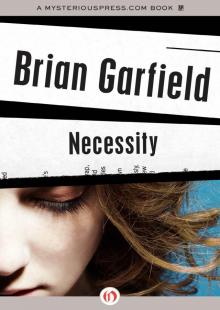 Necessity
Necessity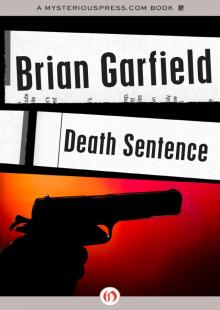 Death Sentence
Death Sentence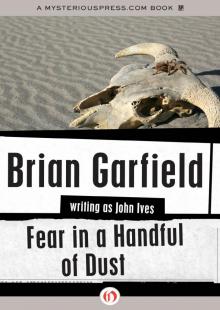 Fear in a Handful of Dust
Fear in a Handful of Dust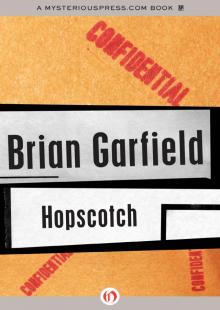 Hopscotch
Hopscotch